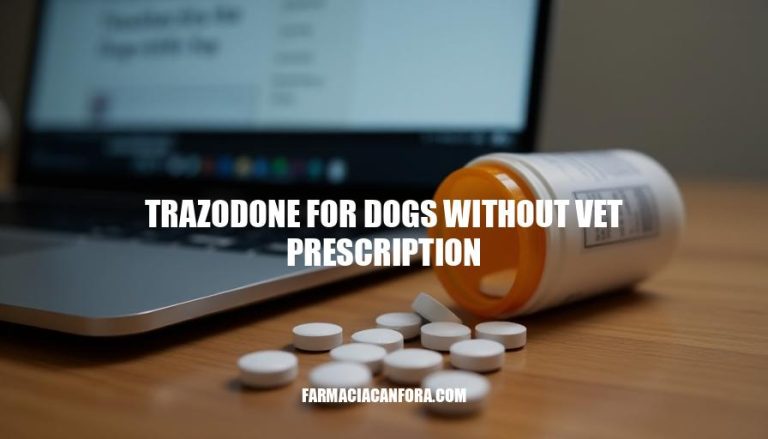


Trazodone helps with anxiety, depression, and insomnia in both people and animals. For dogs, it can calm them down when they’re anxious or stressed, like during surgery recovery. But some pet owners are getting trazodone for their dogs without a vet’s help, which is a problem.
Without a vet, the dog might get too much of the medicine, have bad interactions with other drugs, or not get treated for underlying health issues. Working with a vet ensures the right dose and helps keep your dog safe and healthy.
Using trazodone for dogs without a veterinarian’s prescription poses significant risks. Without professional guidance, determining the correct dosage becomes a challenge. Dosage for dogs is typically calculated based on weight, ranging from 2 to 9.5 mg/kg per dose, but this requires precise adjustments tailored to the dog’s specific needs, health conditions, and concurrent medications.
Administering an incorrect dose can lead to severe consequences, including overdose or insufficient therapeutic effects.
Possible side effects of trazodone in dogs include lethargy, vomiting, diarrhea, loss of coordination, and changes in appetite. More severe reactions, such as seizures, tremors, or serotonin syndrome—a potentially life-threatening condition caused by excessive serotonin levels—can occur. Symptoms of serotonin syndrome include elevated heart rate, tremors, dilated pupils, and difficulty breathing.
These risks are heightened when trazodone is used without veterinary oversight, as pet owners may not recognize early signs of adverse reactions or know how to respond appropriately.
Misuse of trazodone can also result in harmful interactions with other medications the dog may be taking. For example, combining trazodone with other serotonergic drugs can increase the risk of serotonin syndrome. Additionally, certain breeds or dogs with pre-existing conditions, such as liver or kidney impairment, may be more susceptible to side effects.
Veterinary oversight is crucial to ensure the dog’s health and safety.
Veterinarians assess the dog’s overall health, medical history, and specific needs before prescribing trazodone. They provide tailored dosing instructions, monitor for potential side effects, and adjust treatment plans as needed. This professional guidance minimizes risks and ensures the medication is used effectively and safely.
Administering trazodone without a prescription not only endangers the dog’s well-being but also undermines the importance of responsible pet care.
Consulting a veterinarian is essential to safeguard the dog’s health and achieve the desired therapeutic outcomes.
1www.bestiepaws.com2bing.com3vetexplainspets.com
Using trazodone for dogs without a veterinarian’s prescription poses significant risks, including incorrect dosing, adverse reactions, and interactions with other medications. Without proper guidance, pet owners may not recognize early signs of side effects or know how to respond appropriately.
Administering an incorrect dose can lead to severe consequences, such as overdose or insufficient therapeutic effects. Possible side effects include lethargy, vomiting, diarrhea, loss of coordination, and changes in appetite, while more severe reactions like seizures, tremors, or serotonin syndrome can occur.
Misuse of trazodone can also result in harmful interactions with other medications the dog may be taking, particularly serotonergic drugs. Certain breeds or dogs with pre-existing conditions, such as liver or kidney impairment, may be more susceptible to side effects.
Veterinary oversight is crucial to ensure the dog’s health and safety. Veterinarians assess the dog’s overall health, medical history, and specific needs before prescribing trazodone, providing tailored dosing instructions, monitoring for potential side effects, and adjusting treatment plans as needed.
Consulting a veterinarian is essential to safeguard the dog’s health and achieve the desired therapeutic outcomes. Administering trazodone without a prescription not only endangers the dog’s well-being but also undermines the importance of responsible pet care.
It is imperative that pet owners seek professional advice before administering medications, including trazodone, to their dogs. A veterinarian can provide personalized guidance and ensure the medication is used effectively and safely.